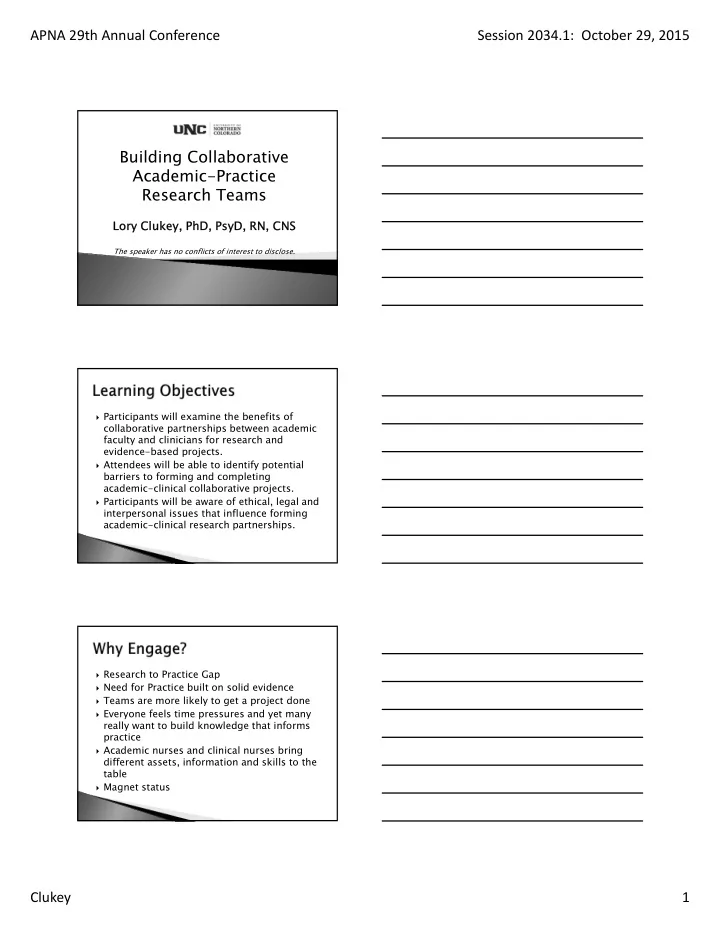

APNA 29th Annual Conference Session 2034.1: October 29, 2015 Building Collaborative Academic-Practice Research Teams Lory Lory Clukey Clukey, PhD, PhD, PsyD PsyD, RN, CNS RN, CNS The speaker has no conflicts of interest to disclose. Participants will examine the benefits of collaborative partnerships between academic faculty and clinicians for research and evidence-based projects. Attendees will be able to identify potential barriers to forming and completing academic-clinical collaborative projects. Participants will be aware of ethical, legal and interpersonal issues that influence forming academic-clinical research partnerships. Research to Practice Gap Need for Practice built on solid evidence Teams are more likely to get a project done Everyone feels time pressures and yet many really want to build knowledge that informs practice Academic nurses and clinical nurses bring different assets, information and skills to the table Magnet status Clukey 1
APNA 29th Annual Conference Session 2034.1: October 29, 2015 Many minds are better than 1 mind Different disciplines bring different perspectives…interesting and enriching Professional development Burn out prevention Learning Visibility and prestige Relationships Personal satisfaction Type of project being formed: ◦ Human Subject Research, ◦ Evidence Based Project, ◦ Quality Improvement Project Need for IRB approval Need for business and legal expertise and highest level of administration support ◦ Product production Software, instrument development, program Interagency agreement ◦ Different organizational purposes ◦ Different structures ◦ Different culture ◦ Different languages Need for formalized contract…even among friends Ethical and Legal considerations Financial Issues ◦ Costs & profits ◦ Marketing & representation Clukey 2
APNA 29th Annual Conference Session 2034.1: October 29, 2015 Collectively develop a plan for: ◦ Purpose ◦ Conduct ◦ Workload distribution (roles & responsibilities) ◦ Timeline(s) ◦ Resource distribution (payment) ◦ Data ownership (intellectual property) ◦ Product ownership (financial compensation) ◦ Patents ◦ Time limit for contractual agreement Difficult process Big problem = mismatched expectations Need precise delineation of: ◦ responsibilities for each person involved ◦ administrative support ◦ time commitments (projected then add some) ◦ payment ◦ expected outcome(s) or products Don’t leave anything assumed – THIS IS ESSENTIAL!!! Put EVERYTHING in writing – even with friends Each stakeholder shares perspectives, expectations, concerns Requires a willingness to negotiate, compromise, communicate clearly & directly Consensus needed Need organizational approval Need legal representation and approval Consider cost and benefits that might not be very obvious (prestige, visibility, reputation) Clukey 3
APNA 29th Annual Conference Session 2034.1: October 29, 2015 Different organizational ◦ Purpose ◦ Structure ◦ Goals ◦ Culture ◦ Expectations ◦ Reward systems ◦ Legal regulations ◦ Economic incentives ◦ Academic and Healthcare Businesses are different animals Pressure for public institutions to generate new funding sources => expanding patents; stronger intellectual property protection; protecting inventions (genetic; software) Changing regulations regarding “technology transfer offices” Competition for limited resources Unclear legal regulations Communication, communication, communication… Enhanced job satisfaction => retention Clinical: targeted patient population; physical resources (labs, equiptment); expertise in disease management; most knowledgeable of clinical problems (set research priorities); feasibility of interventions; clinical testing Academic: experts in research design, theory testing; data collection, management, stats & analysis; funding, grant writing, publication; research laboratories, libraries Clukey 4
APNA 29th Annual Conference Session 2034.1: October 29, 2015 Bleich, M. R., Hewlett, P. O., Miller, K. L., Bender, K. (2004). Beyond tradition: Synergizing intellectual and material capital to forge the new academic-service partnership. Journal of Professional Nursing, 20(5), 285-294. Blumenthal, D., & Meyer, G. S. (1996). Academic health centers in a changing environment. Health Affairs , 15(2), 200-215. Cervantes, M. (2015). Academic Patenting: How universities and public research organizations are using their intellectual properto to boost research and spur innovative start-ups. World Intellectual Property Organization . Retrieved from: http://www.wipo.int/sme/en/documents/academic_patenting.html Centrella-Nigro, A. M., Faber, K., Wiklinski, B., Bognar, L., Flynn, D. L., LaForgia, M. (2015). Effective collaboration among magnet hospitals: A win-win for nurses and institutions. American Journal of Nursing, 115(7), 50-54. Edward, K. (2015). A model for increasing appreciation, accessibility and application of research in nursing. Journal of Professional Nursing , 31(2), 119-123. Foote, J. M., Conley, V., Williams, J. K., McCarthy, A. M., Countryman, M. (2015). Academic and institutional review board collaboration to ensure ethical conduct of doctor of nursing practice projects. Journal of Nursing Education , 54(7), 373-377. Hulcombe, J., Sturgess, J., Souvlis, T., Fitzgerald, C. (2014). An approach to building research capacity for health practitioners in a public health environment: An organizational perspective. Australian Health Review, 38, 252-258. Krumm, S. & Mock, V. (2005). Maximizing clinical-academic partnerships in studies of symptom management: Examples of success. Advanced Studies in Nursing, 3(5), 164-169. Overholser, J. C. (2014). Protesting the decline while predicting the demise of clinical psychology: Can we avoid a total collapse? Journal of Contemporary Psychotherapy , 44, 273- 281. Clukey 5
Recommend
More recommend